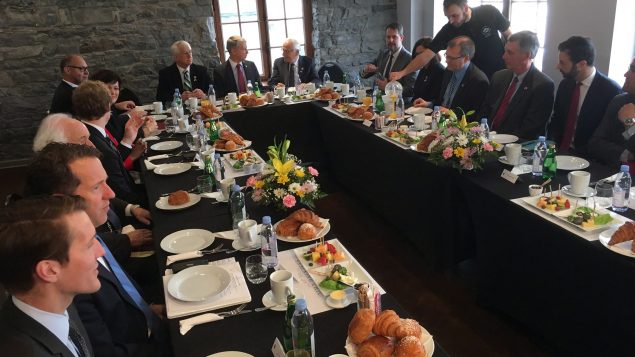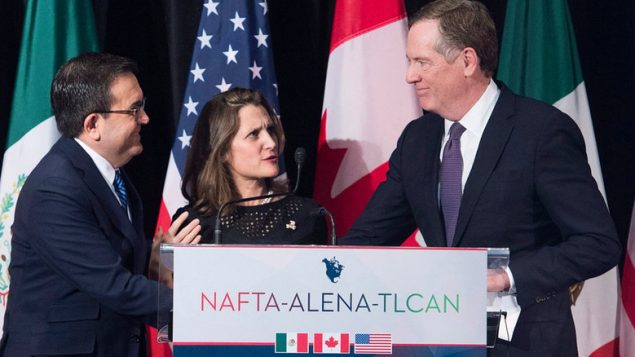NAFTA negotiations in Montreal, the 6th round since August 2016, came to a close today with mixed reviews.
While the parties attempted to put a positive face on the process, tensions between Canada and the United States, over the age-old irritant of softwood lumber, flared again.

A group of Canadian and American politicians gather for a breakfast conversation about NAFTA during the 6th round of talks in Montreal, on Jan. 27, 2018. (Alex Panetta CP)
Canadian exports of softwood have been a source of trade trouble since the early 1980’s.
The latest challenge was initiated by the U.S. imposition of tariffs on softwood, and Canada eventually responding by filing a complaint to the World Trade Organization.
Negotiating about negotiating
This move angered the American, and today, in his closing remarks, U.S. trade representative, Robert Lighthizer, referred to the WTO complaint as “a massive attack on all of our trade laws.”
For her part, Canada’s Minister of Foreign Affairs, Chrystia Freeland, defended the move to the WTO, saying, “Canadians expect us to support our workers and our industry and we will do that.”
in addressing the parties at the conclusion of the Montreal round, Freeland said, “We are always looking for innovative compromises.”
The North American Free Trade Agreement, between Canada, the United States and Mexico, first came into effect in January 1994.
These negotiations are an attempt to update and modernise trade between the three countries.
Against the backdrop of the severely protectionist leanings of the United States, the re-negotiation efforts have been moving slowly, with several challenging issues.
ListenThe auto industry and rules of origin regulations concerning car parts, a dispute resolution, and the 5 year review process are some of the major issues currently between Canada and the U.S.
The revised Canadian proposals on rules of origin, an attempt at compromise, were not an improvement according to Lighthizer.
NAFTA 2.0
Mexico’s Secretary of Economy, Ildefonso Guajardo Villarrea, who leads that country’s delegation, said progress had been made in this round citing the now closed chapter on ‘Anti-corruption’ measures.

Workers sort wood at Murray Brothers Lumber Company woodlot in Madawaska, Ont. on April 25, 2017. (Sean Kilpatrick CP)
Robert Lighthizer, agreed the Montreal round was “a step forward” but a new deal still appears to be in the distant future.
In her closing remarks, Chrystia Freeland reiterated that the current NAFTA covers “the largest free-trade zone in the world:”
She said it is a regional market of $21 billion with 480 million consumers that make up 30 per cent of global G.D.P.
But for President Donald Trump, there may be more to be gained politically in this year’s midterm elections in the U.S. by ending the current agreement and embarking on bilateral agreements with Canada and Mexico separately.
In the meantime, the negotiations continue with Round 7 scheduled to begin at the end of February in Mexico City.
An 8th round is planned for Washington in the spring.







For reasons beyond our control, and for an undetermined period of time, our comment section is now closed. However, our social networks remain open to your contributions.